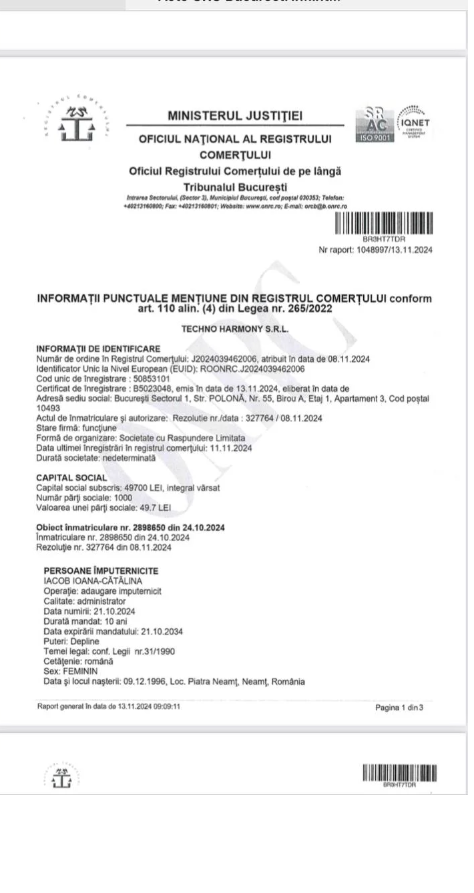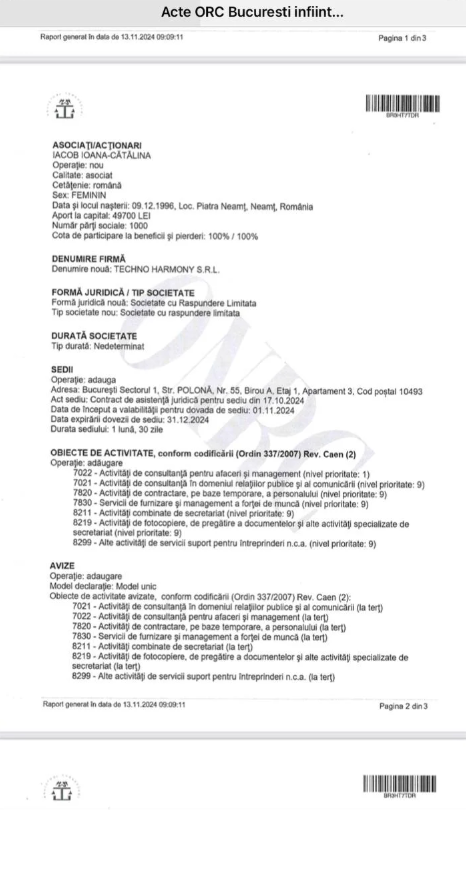Lawyer, specialist in the practice of international corporate law, fintech and legal support of businesses in the EU and Asia. A lot of practical experience and successful cases in the portfolio.
Client: Roman
Goal: opening a business in Romania
Business: stationery trade
Objective: Help a client who is a non-resident to successfully register a trading company in Romania, ensuring compliance with all legal, financial, and administrative requirements
Company registration in Romania for non-residents may seem like a complex process, as it involves a range of legal, financial, and administrative requirements.
However, the story of our client, Ukrainian entrepreneur Oleksandr, proves that with the right strategy and support, this process can be made as simple and efficient as possible.
- Market Analysis and Business Planning
The first step to successfully registering a company in Romania was analyzing the IT services market. Our team conducted a detailed study of the Romanian stationery market, allowing us to assess the demand for stationery and related products.
The client is interested in providing stationery of Ukrainian production for small and medium-sized enterprises. We also prepared a comprehensive business plan, including financial forecasts for the next three years, competitor assessment, and development of a marketing strategy for entering the Romanian market. Our task was to offer the client the most effective way to succeed in the Romanian stationery market.
- Choosing the Organizational and Legal Form
Taking into account the specifics of the Romanian market, the client chose the form of company - a limited liability company (SRL - Societate cu Răspundere Limitatä). This form is the most popular for small and medium-sized enterprises in Romania due to its simplicity and the ability to limit the liability of owners.
Since SRL is the most convenient option for new businesses, choosing this form was a logical and reasonable decision to ensure an effective business start.
- Obtaining an Identification Number for Non-Residents (CIF)
As a non-resident of Romania, Alexander had to go through the process of obtaining the identification number for non-residents (CIF). This is an essential step because without this number, no commercial activity can be conducted in the country. The process of obtaining this number involves several stages, such as submitting an application to the relevant authorities and verifying the founder's identity. Our team provided full support to the client at every stage of this procedure, allowing the process to proceed smoothly.
- Reserving the Company Name and Registration
After obtaining the CIF, we approached the National Trade Register of Romania to reserve the company name. This is an important step in the registration process, as choosing and registering a company name is a mandatory requirement to start a business. Once we confirmed the uniqueness of the name, we received official confirmation and a certificate for the right to use the selected name for the company.
This allowed us to move forward with the official company registration.
- Opening a Bank Account and Depositing the Authorized Capital
The next step was to open a bank account in the name of the future company. According to Romanian law, a minimum share capital of 200 RON (approximately 40 euros) is required for company registration. However, the client decided to deposit a larger amount, specifically 40,000 euros, to ensure better financial stability for the company during its initial years.
This allowed us to successfully begin the registration process.
- Preparing the Founding Documents
One of the important stages was preparing the founding documents of the company, which included the articles of incorporation, the founders' protocol, and other legal documents. After these documents were drafted and verified for compliance with Romanian legislation, we approached a notary for certification.
The notary also issued a certificate confirming the payment of the share capital, which was necessary to submit the documents to the registration authorities.
- Registration with the Romanian Trade Registry
After completing all the preparatory stages, we submitted the documents to the Romanian Trade Register for the official company registration. After reviewing the submitted documents and confirming their compliance with the requirements, the company was officially registered in the Romanian business registry, allowing the client to begin commercial operations.
- Obtaining a Tax Number and Registration in the Social Security System
After the company was registered, Alexander received a tax number (CIF), which is essential for conducting business and paying taxes in Romania. In addition, we registered the company in Romania's social insurance system. This enabled the company to fulfill its obligations regarding social contributions when hiring employees, which is an important aspect of running a business in Romania.
- Opening an Office and Hiring Employees
After the company registration process was completed, Alexander opened an office in Bucharest, where the process of hiring employees began. Additionally, the client signed contracts with suppliers of office supplies and launched a marketing campaign to attract new clients.
Alexander and his team focused on developing software solutions for local businesses that required process automation, helping the company become competitive in the Romanian IT services market.
Thanks to careful preparation and adherence to all legal requirements, we helped Oleksandr successfully register his company in Romania. As a result, the company quickly adapted to the market and began attracting its first clients.
Within a few months, the company signed several contracts with well-known Romanian enterprises, which allowed it to achieve stable financial growth.
Oleksandr’s successful experience highlights the importance of the right approach and proper legal support when registering a business in Romania, as well as how our team at Prikhodko and Partners helps entrepreneurs realize their ideas in the international business environment.
In this case, I successfully helped a non-resident client register a trading company in Romania, ensuring full compliance with all legal, financial, and administrative requirements. Thanks to our experience and deep understanding of local legislative norms, the client received a reliable foundation for conducting business in Romania, which allowed them to effectively integrate into the European market and carry out business operations without legal obstacles.


































